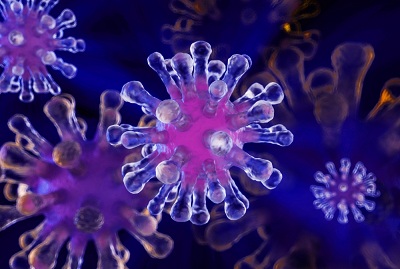SARS-CoV-2 Viral Proteins Causes A Wide Disarray Of Cellular Pathways In Humans! Another Study Shows That SARS-CoV-2 Can Cause Accelerated Aging!
Source: Post COVID-19 News May 01, 2021 4 years, 9 months, 3 weeks, 1 day, 10 hours, 22 minutes ago
Many around the world are still world are still living in an illusion that should they contract SARS-CoV-2 and only experience mild or moderate conditions and “recover” (As per standards set using the PCR Tests), then they are ok. Worst are those that are asymptomatic, thinking that they have somehow defeated the virus.

To date, we still have no proper test that can detect
viral persistence in human and neither do we know about how the various viral proteins produced by the virus during replication is affecting the human body even after there is no active SARS-CoV-2 in the human host body.
Already one study is showing that just the presence of the spike protein in the human host and not the whole virus is sufficient to cause a serious of endothelial function impairments in the human host.
https://www.ahajournals.org/doi/10.1161/CIRCRESAHA.121.318902
In the above study, the researchers created a 'pseudovirus' that was surrounded by SARS-CoV-2 classic crown of spike proteins, but did not contain any actual virus. Exposure to this pseudovirus resulted in damage to the lungs and arteries of an animal model, proving that the spike protein alone was enough to cause disease. Tissue samples showed inflammation in endothelial cells lining the pulmonary artery walls.
The study team then replicated this process in the lab, exposing healthy endothelial cells (which line arteries) to the spike protein. They showed that the spike protein damaged the cells by binding ACE2. This binding disrupted ACE2's molecular signaling to mitochondria (organelles that generate energy for cells), causing the mitochondria to become damaged and fragmented.
Past studies have shown a similar effect when cells were exposed to the SARS-CoV-2 virus, but this is the first study to show that the damage occurs when cells are exposed to the spike protein on its own.
Assistant Research Professor Uri Manor from Salk Institute, who is co-senior author of the study told Thailand Medical News, "If you remove the replicating capabilities of the virus, it still has a major damaging effect on the vascular cells, simply by virtue of its ability to bind to this ACE2 receptor, the S protein receptor, now famous thanks to COVID. Further studies with mutant spike proteins will also provide new insight towards the infectivity and severity of mutant SARS CoV-2 viruses."
The study findings could also have possible implications about vaccines using the spike proteins or even vaccines inducing the body to produce spike -ike proteins to stimulate the antibody elements of the immune system.
We now also have a much more interesting proteomic study by researchers from the Institute of Virology in Munich that shows that the SARS-CoV-2 viral proteins are able to cause a whole range of perturbations to the human host proteome.
https://www.nature.com/articles/s41586-021-03493-4
The study team profiled the interactomes of both the SARS-CoV-2 and SAR-CoV viruses, as well as their influence on the transcriptome, proteome, ubiquitinome and phosphoproteome of a lung-derived hum
an cell line.
Projecting these data onto the global network of cellular interactions revealed crosstalk between the perturbations taking place upon infection with SARS-CoV-2 and SARS-CoV at different levels and enabled identification of distinct and common molecular mechanisms of these closely related coronaviruses.
Alarmingly so many human cellular pathways were found to be affected! The TGF-β pathway, known for its involvement in tissue fibrosis, was specifically dysregulated by SARS-CoV-2 ORF8 and autophagy was specifically dysregulated by SARS-CoV-2 ORF3.
The implications of the study are numerous and worrisome and needs detailed urgent attention. We could be having a phenomenal post-COVID health crisis in coming years should and if the COVID-19 pandemic ends.
Another study has also emerged showing that the SARS-CoV-2 virus is able to cause accelerated aging as it is capable of shortening the telomeres of the human host DNA!
https://www.medrxiv.org/content/10.1101/2021.04.23.21255973v2
The study found that among COVID-19 survivors, the presence of the so-called post-COVID19 syndrome (PPCS) is a common finding. In patients who survived the SARS-CoV-2 infection, overt PPCS presents one or more symptoms such as fatigue, dyspnea, memory loss, sleep disorders, and difficulty concentrating.
The pathophysiology of PPCS is currently poorly understood, and whether epigenetic mechanisms are involved in this process is unexplored.
A cohort of 117 COVID19 survivors (post-COVID19) and 144 non-infected volunteers (COVID19-free) were analyzed using pyrosequencing of defined CpG islands previously identified as suitable for biological age determination. Besides, telomere length (TL) and ACE2 and DPP4 receptor expression were determined.
Alarmingly, the study findings showed a consistent biological age increase in the post-covid population (mean 58,44 DS 14,66 ChronoAge Vs. mean 67,18 DS 10,86 BioAge, P<0,0001), determining a DeltaAge acceleration of 10,45 DS 7,29 years (+5.25 years above range of normality) compared to 3,68 DS 8,17 years for the COVID19-free population (P<0,0001).
A significant telomere shortening parallels this finding in the post-COVID19 cohort compared to COVID19-free subjects (post-COVID19 TL: 3,03 DS 2,39 Kb vs. COVID19-free: 10,67 DS 11,69 Kb; P<0,0001).
Additionally, ACE2 expression was decreased in post-COVID19 patients compare to COVID19-free, while DPP-4 did not change.
In light of these observations, the study concluded that some epigenetic alterations are associated with the post-COVID19 condition, particularly in the younger (<60 years). Although the consequences of such modifications on the long-term clinical outcome remain unclear, they might indicate a direction to investigate the pathophysiological basis of the post-COVID19 syndrome.
Please help donate to sustain this website and other websites we are currently own and also to support some of our related initiatives. We are desperate for help. Thank You. https://www.thailandmedical.news/p/sponsorship
For more on the
long term effects of SARS-CoV-2 on the human host, keep on logging to Thailand Medical News.
